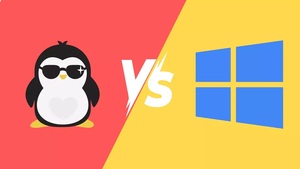The Ultimate Showdown: Linux vs. Windows
الجسم
In the realm of operating systems, the debate between Linux and Windows has been ongoing for decades. Both have their unique strengths and weaknesses, catering to different user needs. This article delves into a comprehensive comparison of Linux vs Windows, focusing on security, performance, usability, and overall functionality.
Introduction
Operating systems are the backbone of computing devices, managing hardware and software resources and providing essential services for computer programs. Linux and Windows are two of the most popular operating systems, each with its dedicated user base. Understanding their differences is crucial for making an informed decision about which OS to use.
Security: Linux vs Windows Security
When it comes to security, Linux is often touted as the more secure operating system. This perception is largely due to its open-source nature, which allows for continuous scrutiny and improvement by a global community of developers. Vulnerabilities are typically identified and patched quickly, making it harder for malicious actors to exploit them.
Windows, on the other hand, is a frequent target for malware and viruses due to its widespread use. However, Microsoft has made significant strides in improving Windows security with regular updates and robust security features like Windows Defender. Despite these advancements, the sheer volume of attacks on Windows systems means users must remain vigilant and use additional security measures.
Performance: Linux Operating System vs Windows
Performance is another critical factor when comparing Linux vs Windows. Linux is known for its efficient resource usage, making it an ideal choice for older hardware and systems with limited resources. The modularity of Linux allows users to customize their OS to meet specific performance needs, often resulting in faster boot times and better overall system responsiveness.
Windows, while generally more resource-intensive, offers excellent performance on modern hardware. It provides a more consistent user experience across different devices and is optimized for a wide range of applications, particularly those requiring high-end graphics and processing power.
Usability: Linux vs Windows
Usability is where the two operating systems diverge significantly. Windows is renowned for its user-friendly interface, making it accessible to users of all skill levels. The familiar desktop environment, extensive software library, and robust support ecosystem make Windows a go-to choice for many individuals and businesses.
Linux, although traditionally seen as more complex, has made great strides in user-friendliness, especially with distributions like Ubuntu, Fedora, and Linux Mint. These distributions offer intuitive graphical user interfaces and easy installation processes, lowering the barrier to entry for new users. However, Linux's true power lies in its flexibility and customization options, which can be overwhelming for beginners but a boon for advanced users.
Software Availability
Software availability is another area where Windows holds an advantage. The vast majority of commercial software, including popular productivity tools and games, are designed for Windows. This extensive library makes Windows a preferred choice for users who rely on specific applications for their daily tasks.
Linux, while not as rich in commercial software, excels in providing open-source alternatives. Many powerful and free applications are available for Linux, covering a broad spectrum of uses from office productivity to advanced programming. Additionally, the increasing adoption of web-based applications has narrowed the software gap between the two operating systems.
Conclusion
The choice between Linux and Windows ultimately depends on individual needs and preferences. For those seeking a secure, customizable, and resource-efficient operating system, Linux is an excellent choice. It offers unparalleled flexibility and is supported by a passionate community of developers and users.
Conversely, Windows is ideal for users who prioritize ease of use, software availability, and seamless integration with various hardware and applications. Its user-friendly interface and extensive support network make it a solid option for both personal and professional use.
In the end, the decision of Linux vs Windows comes down to what you value most in an operating system. Whether it's the security and customization of Linux or the usability and software compatibility of Windows, both systems offer robust solutions for different computing needs.










تعليقات